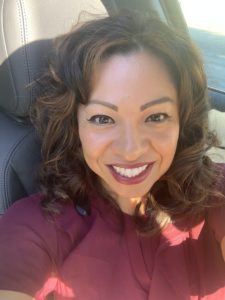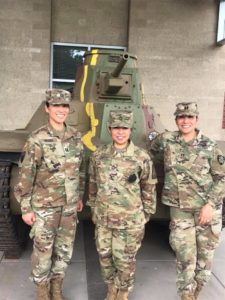When Cristina Garcia retired from the military after 24 years of service, she was scared of what would come next. “The last few months of my active duty I was stressed. I had anxiety. I had a little bit of depression,” she said. She thought to herself, “where’s my paycheck going to come from? Is anybody going to hire me? Yes, I have skills and talents and abilities, but what is it that civilian companies need?”

She started her search with organizations, like Goodwill and the Salvation Army, that have veteran transition programs. Through her experience, she learned what the gaps in support for veterans are as they enter civilian life. “You’re really on your own because there’s nobody to take you by the hand. You have to go out there and find that specific organization that’s going to help you.”
Eventually, Cristina joined US Vets, a national nonprofit organization that provides comprehensive services to veterans, including those at risk and unhoused. The position was a perfect fit for her. As a Diversity and Immigration Liaison while at the California National Guard, Cristina assisted over 60 servicemembers and their families to obtain citizenship, work permits, and social security cards. “I think that was the most rewarding position because I was able to assist not only the soldiers that I served with but their families as well. That debt of gratitude helped fulfill my heart.”
At US Vets, she was appointed program coordinator for Women Vets On Point in Los Angeles, a program that offers mental health and wellness services to women veterans, regardless of their discharge. Since the start of the pandemic, they shifted to virtual counseling services and redoubled their community partnership efforts to help women veterans in these challenging times. They also act as a referral service for everything from housing and childcare to job search and entrepreneurship training.

Cristina feels lucky to be doing this work, especially since she knows how hard the transition can be. “You sink or swim. In the military, you can’t fail unless you really try. Out here, you can fail from one day to the next and not even know what hit you.” She has witnessed stories of struggle and success, including how entrepreneurship can play a big part in changing people’s lives.
One veteran that she knows battled homelessness, co-authored a book, and now shares her story in the sessions put on by Women Vets On Point. “It’s amazing to hear her story because military sexual trauma was in her past, homelessness was in her past, but now she’s a co-author and still giving back to the community through the VA and through these Zooms that we host.”
Through this and many other experiences, Cristina realized how well-suited women veterans can be for a career in entrepreneurship – with the appropriate support.
“Being in the military, it takes a certain kind of person. It takes a person that wants to help, that wants to make a difference, that is unselfish and that wants to challenge themselves. I think that those are all traits that an entrepreneur has. The path is very similar. It’s just that our missions are different. So if there could be a bridge in the gap of mission and taskings, then a military member can see that being an entrepreneur is the way to go.”
In her eyes, organizations like CAMEO and the WOVEN program can be that bridge to provide women veterans the tools to become entrepreneurs. “Military members are very set in our ways and how we do things. For us, the creativity level is not where it needs to be in order to be an entrepreneur. If we had the training or that motivation to get out there, we absolutely could be successful.”
